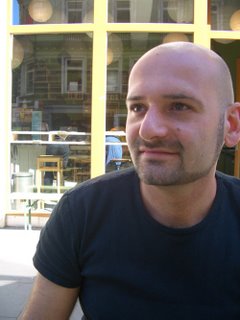So I shout (silently), Give Peas a Chance, a version of the nineteen-sixties call for civil rights, freedom, and justice for all peoples: Give Peace a Chance. For while elusive peace beckons while we strive… or make strife, the small green pellet-like vegetable is at hand. And it is good.
After nearly two weeks into this Middle East war, I am putting into words my silences and sadness, conviction and doubt, and the pain even in thinking and talking about war raging in Israel (one of my two homes) and in Lebanon and Gaza and neighboring areas. I am blessed to be a citizen of two democracies: America and Israel. That's being twice blessed when millions tragically aren't even once blessed... yet.
Thanks to my pal Stephanie for gentle persistent prodding and to other friends for helping to launch this posting. More will follow.
hi tamar...i need your take on what's happening in israel and lebanon...i feel so awful about it all...you must be worried about family and friends...let me hear from you...the world feels like a crazy place right now...
— love, phyl
hi tamar. i am SOOO pissed off! i cannot stand it any longer: the media, colleagues at work etc: the bad israel destroying everything in lebanon as if there was no reason for it. as if israel wanted to hunt the lebanese, extinguish the lebanese. poor lebanese here, poor lebanese there. (i also feel sorry for them, they have to leave their houses, their possessions are ruined - but i put it in a relation and see who is responsible for the situation - hizballah!)
why is it so easy to feel sorry for the lebanese and so hard to feel sorry for the israelis? in other words: why is it so easy to feel sorry for non-Jews and so hard to feel sorry for jews???? maybe that is the right question?
how can i confront these people around me without getting angry? if something crosses your mind, it will be much appreciated!
— love, stefan
Most Israelis and Lebanese would like nothing better than to live (and die) in safety – and over a natural lifespan.
They aim to learn, sing, garden, drink good coffee or tea, work, travel, decorate, sew, swim, pray to the God of their understanding, vacation, ride busses and trains, visit an ATM, buy stamps, test new recipes, borrow library books, walk the dog, water the plants, take out the garbage, exercise, attend conferences, blog.
Yet reality intrudes.
During its millennia-long pre-rebirth gestation, the declaration of statehood in 1948, and following decades, Israel has been engaged in an existential struggle with her neighbors and their partners. Nonstop. Always. The front lines: Middle East. The casualties: worldwide. For those pathologically inclined to hate Israel no matter what, war is what we have. And the human family pays the infinite costs in pain, loss, suffering, and death. Everywhere.
… Sometimes you find yourself in a situation in which peaceful methods will not work. Talking does not work. Trying to work things out does not work. Peace offerings do not work. On the contrary, they are seen as signs of weakness.
Peace loving friends have been expressing their confusion to me, all this week. Surely there is a better way to deal with Hizballah. Surely if we had just sat down with him, surely if, surely if. One sweet soul even went so far as to say that what Nasrallah really needs is a big hug.
It is so hard to believe that some people really and truly are not interested in peace; that they are interested only in winning. And that the only way to deal with them, the only way, is to fight them. Or die.
Israel does not have the luxury I had, to leave and find somewhere else. Israel has to stand and fight, to the death, whatever the price.
— Imshin
Still, no one can kill the vision of peace.
Not even lunatic barbarians who seek to annihilate life, especially “the other.” And, depending on the lunatic, that “other” is you or me and probably both of us.




